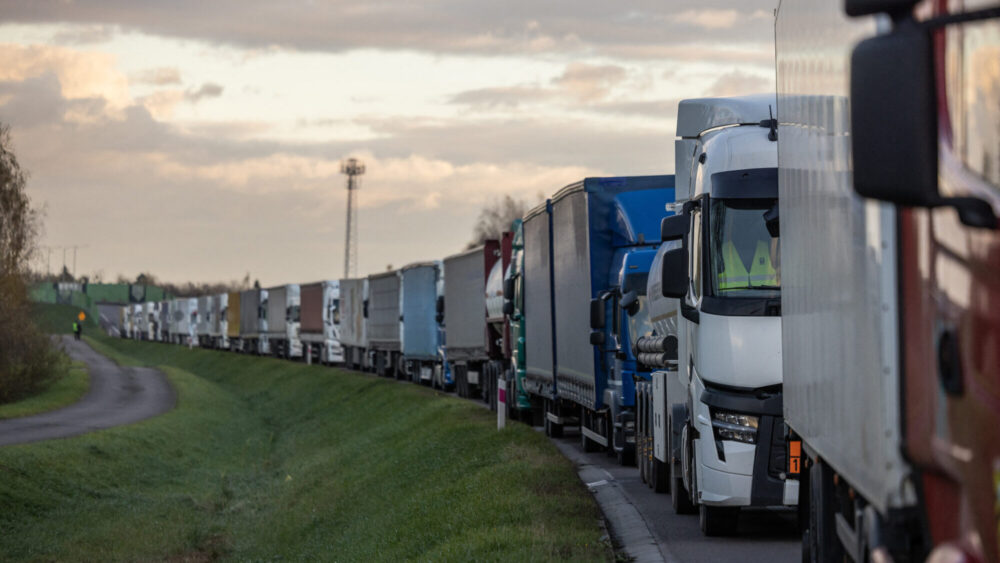
Trucks queue on a motorway as Polish transport company owners with their vehicles block access to the Polish-Ukrainian border crossing in Dorohusk
Photo by Wojtek Radwanski / AFP
The European Union seems to be in no hurry to resolve the plight of Polish truckers who say they have had to endure unfair competition from Ukraine for more than a year. Measures that were meant to help support the Ukrainian economy during the war are now hurting local Polish businesses, according to the protesters.
Truckers started to block three major border crossings with Ukraine on Monday, November 6th, allowing only passenger traffic and transport with humanitarian or military aid to pass through. They intend to uphold the blockade until January 6th if their demands are not met by then.
After Russia’s invasion of Ukraine last February, the EU and Ukraine struck an agreement to allow Ukrainian trucks to enter the EU without entry permits. This has resulted in Ukrainian trucks crossing the Polish border around 900,000 times, compared to 180,000 trucks annually before the war. Polish trucking companies are demanding that restrictions be imposed on the number of Ukraine-registered trucks entering Poland and a ban on transport companies with capital from outside the European Union.
The agreement—signed last June and extended until next June—acknowledges “the unavailability of traditional transport routes in the region” due to the war “and the urgent need to secure supply chains and food security by using alternative routes via road, in particular for the transport of grain, fuel, foodstuffs, and other goods.”
While the agreement makes it easier “to transport goods between the EU and Ukraine,” it does not permit trucks to pick up and drop off loads within the EU’s territory, a practice known as cabotage. The protesting truckers complain that Ukrainian truckers are transporting goods between points within Poland as well as carrying cargo between Poland and third countries.
“Most of the [Ukrainian] trucks come into Poland empty, they collect loads from Poland and take them all over Europe,” transport company owner Bartosz Jasinski said on Monday.
They also say that firms from Russia and Belarus have been registering businesses in Poland. “They drive the prices down and take the cargo that we used to carry,” Marek Oklinski, a transport company owner, told AFP.
One of the Polish protesters told The Financial Times that Ukrainian truckers did not have to comply with EU transport regulations: “We constantly receive new burdens from the EU to which we have to adapt,” while Ukrainian carriers can operate on their “own terms.” The protesters also point to onerous procedures upon returning back to Poland from Ukraine:
The Ukrainian side has created an electronic queue system, where a carrier wanting to enter Poland must register… The waiting time is around 11 or 12 days.
This is not the first time Poland has seen this type of protest, and the developments are very similar to the issue of Ukrainian grain imports. In September, the European Union decided not to renew a ban on Ukrainian food heading to nearby EU countries, after which Poland—along with Bulgaria, Hungary, and Slovakia—imposed its own ban to protect domestic farmers from Ukrainian grain flooding local markets. “We’re going to do it the way farmers did—keep protesting until the government acknowledges the problem and reacts to it,” said Jacek Sokół, an owner of a small trucking company.
However, neither Brussels—nor Warsaw—seem to be too concerned about the Polish truckers’ complaints. The European Conservative contacted the European Commission transport spokesman, Adalbert Jahnz, who reiterated his comments made at a press briefing on Tuesday:
We have been in contact with the Ukrainian and the Polish authorities to assess the situation, but for now I cannot tell you anything further as these contacts are ongoing.
Poland’s infrastructure ministry cited EU rules as a cause for not being able to step in. “The agreement was reached by the EU … therefore, in practical terms, Poland cannot reintroduce the permits system with Ukraine until the aforementioned deal expires,” the ministry said in a statement sent to AFP, calling on the protesters to end the blockade.
The only Polish party that seems to be strongly opposing the harsh treatment of Polish truckers is the nationalist Konfederacja, whose co-leader Krzysztof Bosak held a joint press conference with the owners of trucking companies. He said:
Today, we are standing together with the leaders of the transport industry, with people running a business. The protest is being re-launched due to the failure of the government to meet the industry’s expectations.
Konfederacja was the only major party in the run-up to the Polish parliamentary election on October 15th to criticise many aspects of the military, economic, and humanitarian aid given by Poland to Ukraine, arguing that Poland has duties to itself.
“Maybe some people don’t even realise it. Transport generates 7% of GDP in our country. By comparison, agriculture accounts for only 3%. Mining 5%. So let’s pay attention to the fact that our mostly small family businesses generate a huge income for the Polish state,” business owner Edyta Ozygała told the news conference. Ukraine has been critical of the Polish truckers’ protest with Infrastructure Minister Oleksandr Kubrakov saying the action “harms the interests and economies of both countries,” and Ukraine’s ambassador in Warsaw, Vasyl Zvarych, tweeted: “The blocking of the roads … is a painful stab in the back of Ukraine, which is suffering Russian aggression.”
